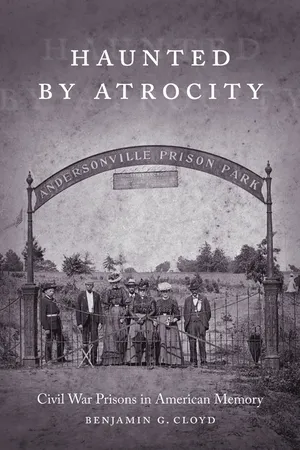
- 280 pages
- English
- ePUB (mobile friendly)
- Available on iOS & Android
About this book
During the Civil War, approximately 56, 000 Union and Confederate soldiers died in enemy military prison camps. Even in the midst of the war's shocking violence, the intensity of the prisoners' suffering and the brutal manner of their deaths provoked outrage, and both the Lincoln and Davis administrations manipulated the prison controversy to serve the exigencies of war. As both sides distributed propaganda designed to convince citizens of each section of the relative virtue of their own prison system -- in contrast to the cruel inhumanity of the opponent -- they etched hardened and divisive memories of the prison controversy into the American psyche, memories that would prove difficult to uproot. In Haunted by Atrocity, Benjamin G. Cloyd deftly analyzes how Americans have remembered the military prisons of the Civil War from the war itself to the present, making a strong case for the continued importance of the great conflict in contemporary America.
Throughout Reconstruction and well into the twentieth century, Cloyd shows, competing sectional memories of the prisons prolonged the process of national reconciliation. Events such as the trial and execution of CSA Captain Henry Wirz -- commander of the notorious Andersonville prison -- along with political campaigns, the publication of prison memoirs, and even the construction of monuments to the prison dead all revived the painful accusations of deliberate cruelty. As northerners, white southerners, and African Americans contested the meaning of the war, these divisive memories tore at the scars of the conflict and ensured that the subject of Civil War prisons remained controversial.
By the 1920s, the death of the Civil War generation removed much of the emotional connection to the war, and the devastation of the first two world wars provided new contexts in which to reassess the meaning of atrocity. As a result, Cloyd explains, a more objective opinion of Civil War prisons emerged -- one that condemned both the Union and the Confederacy for their callous handling of captives while it deemed the mistreatment of prisoners an inevitable consequence of modern war. But, Cloyd argues, these seductive arguments also deflected a closer examination of the precise responsibility for the tragedy of Civil War prisons and allowed Americans to believe in a comforting but ahistorical memory of the controversy. Both the recasting of the town of Andersonville as a Civil War village in the 1970s and the 1998 opening of the National Prisoner of War Museum at Andersonville National Historic Site reveal the continued American preference for myth over history -- a preference, Cloyd asserts, that inhibits a candid assessment of the evils committed during the Civil War.
The first study of Civil War memory to focus exclusively on the military prison camps, Haunted by Atrocity offers a cautionary tale of how Americans, for generations, have unconsciously constructed their recollections of painful events in ways that protect cherished ideals of myth, meaning, identity, and, ultimately, a deeply rooted faith in American exceptionalism.
Frequently asked questions
- Essential is ideal for learners and professionals who enjoy exploring a wide range of subjects. Access the Essential Library with 800,000+ trusted titles and best-sellers across business, personal growth, and the humanities. Includes unlimited reading time and Standard Read Aloud voice.
- Complete: Perfect for advanced learners and researchers needing full, unrestricted access. Unlock 1.4M+ books across hundreds of subjects, including academic and specialized titles. The Complete Plan also includes advanced features like Premium Read Aloud and Research Assistant.
Please note we cannot support devices running on iOS 13 and Android 7 or earlier. Learn more about using the app.
Information
Table of contents
- Cover Page
- Title Page
- Copyright Page
- Dedication
- Contents
- List of Illustrations
- Acknowledgments
- Introduction
- 1 “Our Souls Are Filled with Unutterable Anguish” Atrocity and the Origins of Divisive Memory, 1861–1865
- 2 “Remember Andersonville” Recrimination During Reconstruction, 1865–1877
- 3 “This Nation Cannot Afford to Forget” Contesting the Memory of Suffering, 1877–1898
- 4 “We Are the Living Witnesses” The Limitations of Reconciliation, 1898–1914
- 5 “A More Proper Perspective” Objectivity in the Shadow of Twentieth-Century War, 1914–1960
- 6 “Better to Take Advantage of Outsiders’ Curiosity” The Consumption of Objective Memory, 1960–PRESENT
- 7 “The Task of History Is Never Done” Andersonville National Historic Site, The National Pow Museum, And the Triumph of Patriotic Memory
- Conclusion
- Notes
- Works Consulted
- Index